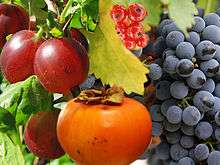berry
English
.jpg)

Pronunciation
- IPA(key): /ˈbɛɹi/
- enPR: bĕ'ri
- Rhymes: -ɛri
- Homophones: bury, Barry (in accents with the Mary–marry–merry merger)
Audio (US) (file) Audio (US) (file)
Etymology 1
From Middle English berye, from Old English beriġe, from Proto-Germanic *bazją[1] (compare German Beere, Norwegian and Danish bær), from Proto-Indo-European *bʰes- (“to blow, chew, rub”), compare Ancient Greek ψάω (psáō, “I rub”), Sanskrit बभस्ति (bábhasti, “he chews, devours”)[2]. For the semantic development, compare Old Church Slavonic гроуша (gruša, “pear”), from гроушити (grušiti, “to break, destroy”); Latin pirum (“pear”), from *peis- (“to stick, pound”)[3].
The slang sense “police car” may come from the lights on the vehicles’ roofs.[4]
Noun
berry (plural berries)
- A small succulent fruit, of any one of many varieties.
- (botany) A soft fruit which develops from a single ovary and contains seeds not encased in pits.
- A coffee bean.
- One of the ova or eggs of a fish.
- (Can we find and add a quotation of Travis to this entry?)
- (slang, US, African American) A police car.
Usage notes
Many fruits commonly regarded as berries, such as strawberries and raspberries, are not berries in the botanical sense, while many fruits which are berries in the botanical sense are not regarded as berries in common parlance, for example bananas and pumpkins.
Derived terms
- apple-berry
- Avignon berry
- baneberry
- barberry
- bayberry
- bearberry
- beautyberry
- the berries
- berry alder
- berry-bearing alder
- berry-button
- berrying
- berryless
- berry sugar
- berry wax
- bilberry, billberry
- blackberry
- blaeberry
- blueberry
- boxberry
- boysenberry
- bramberry
- brambleberry
- bread-berry
- buckthorn berry
- buffalo berry, buffalo-berry, buffaloberry
- bulberry, bullberry, bull berry
- bunchberry
- candleberry
- cassioberry
- checker-berry, checkerberry
- China-berry, chinaberry
- choke-berry, chokeberry
- Christmas berry
- cloudberry
- coffee-berry
- coral-berry, coralberry
- cow-berry, cowberry
- crackerberry
- cranberry
- crowberry
- cubeb berry
- curlew-berry
- dabbery, dayberry, deberry
- deerberry
- dew-berry, dewberry
- dangleberry, tangleberry
- dingleberry
- dogberry
- dway-berry
- egg-berry
- elderberry
- farkleberry
- feaberry
- fen-berry
- foxberry
- French berry
- fryberry
- gallberry
- gooseberry
- guavaberry
- hackberry, hagberry, heckberry, hegberry
- heathberry, heath-berry
- hedge-berry, hedgeberry
- heurtleberry, hurtleberry
- hillberry
- hindberry
- honeyberry
- hound-berry, hound's-berry
- huckleberry
- hurtleberry
- ink-berry, inkberry
- ivenberry, ivy-berry
- Juneberry
- knotberry, knoutberry
- lemonade berry
- lingberry, lingenberry, lingonberry
- logan berry, loganberry
- marionberry
- marlberry
- moss-berry, mossberry
- mulberry
- myrtle-berry
- nannyberry
- naseberry
- nessberry
- nub-berry
- one-berry
- oso-berry
- partridge berry, partridge-berry, partridgeberry
- peaberry
- Persian berry
- pigeon-berry
- poison berry
- pokeberry
- quinsy-berry
- raccoon-berry, racoon-berry
- ramble-berry
- raspberry
- Rhein-berry
- riberry
- roan-berry, rowan-berry
- roebuck-berry
- rumberry
- salal berry
- salmon berry, salmonberry
- scald-berry
- sea-berry
- service-berry, serviceberry
- shadberry
- sheepberry
- silverberry
- snowberry
- soapberry
- sparkleberry
- spiceberry
- strawberry
- sugar berry, sugar-berry, sugarberry
- sunberry
- tayberry
- tea-berry, teaberry
- tetter-berry
- thimbleberry
- timberry
- tummelberry
- twig and berries
- twinberry
- veitchberry
- wax-berry, waxberry
- wheat berry
- whinberry
- whortleberry
- wickeyberry tree
- wineberry
- winterberry
- wolfberry
- wonderberry
- Worcesterberry
- yellow berry
- youngberry
Descendants
- → Thai: เบอร์รี (bəə-rîi)
Translations
|
|
References
- Marlies Philippa et al., eds., Etymologisch Woordenboek van het Nederlands, A-Z, s.v. “bes” (Amsterdam UP, 3 Dec. 2009) .
- J.P. Mallory & D.Q. Adams, eds., Encyclopedia of Indo-European Culture, s.vv. “blow”, “rub” (London: Fitzroy Dearborn, 1997), pp. 72, 490.
- Vladimir Orel, A Handbook of Germanic Etymology, s.v. “*ƀazjan” (Leiden: Brill, 2003), 40.
- Jonathon Green (2018), “berry, n.1”, in Green's Dictionary of Slang
Verb
berry (third-person singular simple present berries, present participle berrying, simple past and past participle berried)
- To pick berries.
- On summer days Grandma used to take us berrying, whether we wanted to go or not.
- To bear or produce berries.
Usage notes
- Unlikely to be used to refer to commercial harvesting of berries.
Derived terms
Etymology 2
From Middle English berȝe, berghe, from Old English beorġe, dative form of beorg (“mountain, hill, mound, barrow”), from Proto-Germanic *bergaz (“mountain, hill”). More at barrow.
Etymology 3
From Middle English bery (“a burrow”). More at burrow.
Noun
berry (plural berries)
- (dialectal) A burrow, especially a rabbit's burrow.
- An excavation; a military mine.
Etymology 4
From Middle English beryen, berien, from Old English *berian (found only in past participle ġebered (“crushed, kneaded, harassed, oppressed, vexed”)), from Proto-Germanic *barjaną (“to beat, hit”), from Proto-Indo-European *bʰer- (“to rip, cut, split, grate”). Cognate with Scots berry, barry (“to thresh, thrash”), German beren (“to beat, knead”), Icelandic berja (“to beat”), Latin feriō (“strike, hit”, verb).
Verb
berry (third-person singular simple present berries, present participle berrying, simple past and past participle berried)